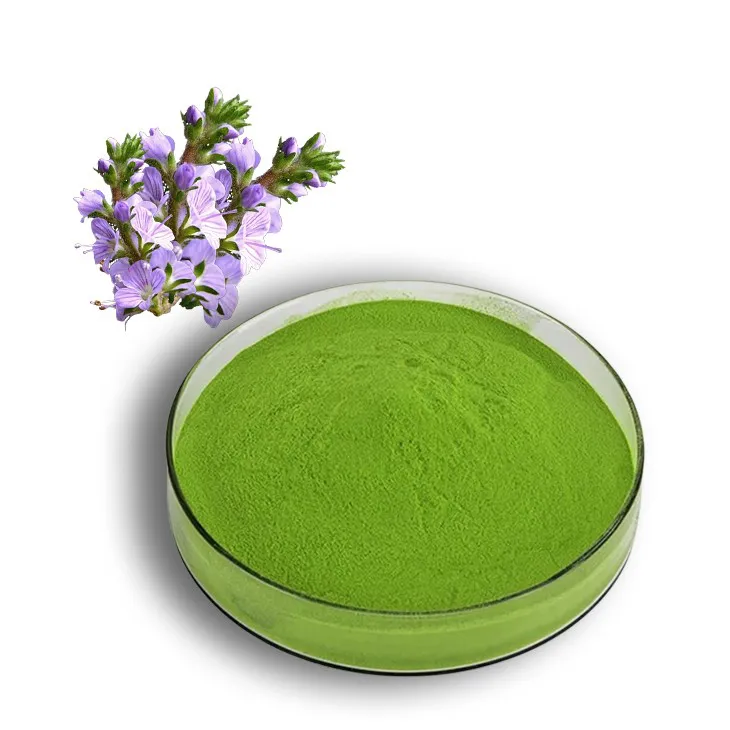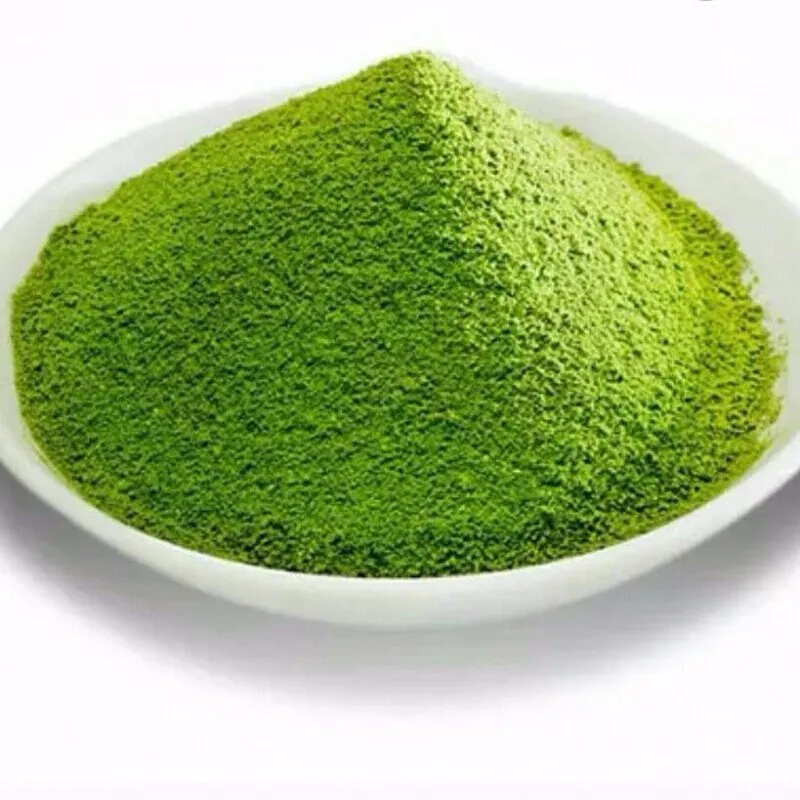- 0086-571-85302990
- sales@greenskybio.com
Standard - process alfalfa meal.
2024-11-28

1. Introduction
Standard - processed alfalfa powder is a remarkable product that has found its significance in numerous fields. Alfalfa, a plant known for its high adaptability and rich nutrition, becomes a source of great potential when converted into powder form.

2. Nutritional Value
Nutrient - Rich Source: Standard - processed alfalfa powder is a concentrated reservoir of nutrients.
- It contains a wide variety of amino acids, which are the fundamental components for building proteins. This makes it an excellent addition to animal feed. For instance, in livestock farming, it can improve the overall health and growth of animals. Moreover, it holds potential benefits for vegetarians and vegans who are constantly seeking alternative sources of protein in their diets.
- The presence of chlorophyll gives alfalfa powder its characteristic green color. Chlorophyll is associated with several health benefits. It is believed to play a role in the body's detoxification processes. Toxins in the body can be harmful, and chlorophyll may help in their removal, thus promoting overall well - being.

3. Role in Agriculture
Soil Amendment: Standard - processed alfalfa powder has a significant role in agriculture.
- When added to the soil, it enriches the soil with organic matter. This addition improves the soil structure. A well - structured soil allows for better water retention, air circulation, and root penetration. For example, in a vegetable garden, the use of alfalfa powder can transform the soil quality, leading to healthier plant growth.
- It also promotes the growth of beneficial microorganisms. These microorganisms are essential for various soil functions, such as nutrient cycling and disease suppression. In a field of cereal crops, the presence of these microorganisms due to alfalfa powder addition can enhance the crop's resistance to diseases and improve nutrient uptake.

4. Manufacturing and Commercial Aspects
Quality Standardization: The standardization of alfalfa powder processing is crucial in the manufacturing and commercial sectors.
- For industries like the food and feed industries that rely on alfalfa powder, consistent quality is a must. Standardized processing ensures that each batch of the powder has the same nutritional composition and quality characteristics. This allows for reliable product formulations and consistent end - product quality.
- Another advantage is in terms of storage and transportation. Alfalfa powder can be stored and transported more conveniently compared to fresh alfalfa. It takes up less space and is less prone to spoilage and waste. This is especially important for large - scale commercial operations where efficiency in logistics is key.
5. Impact on Human Health
Blood Sugar Management: Alfalfa powder has been the subject of studies regarding its potential role in managing blood sugar levels.
- Some research indicates that certain compounds present in alfalfa may contribute to the regulation of insulin sensitivity. However, it should be noted that more in - depth research is still required to fully understand this relationship. For individuals with concerns about blood sugar management, such as those with pre - diabetes or diabetes, alfalfa powder could potentially be a valuable addition to their diet.
- It has a relatively low glycemic index. Foods with a low glycemic index are digested and absorbed more slowly, resulting in a more gradual rise in blood sugar levels. This makes alfalfa powder a suitable component in diets for those aiming to control their blood sugar levels.
6. Processing Methods
Harvesting: The first step in processing alfalfa into powder is proper harvesting. Alfalfa is typically harvested when it reaches the optimal stage of growth. This ensures that the plant contains the maximum amount of nutrients.
- Timing is crucial. If harvested too early, the plant may not have fully developed its nutritional content. On the other hand, if harvested too late, the quality may deteriorate.
- After harvesting, the alfalfa needs to be dried. Drying helps to remove moisture, which is essential for preventing spoilage during storage. There are different methods of drying, such as air - drying and mechanical drying.
- Air - drying is a more natural method but may take longer, while mechanical drying is faster but requires proper equipment to ensure that the heat does not damage the nutritional value of the alfalfa.
- Once the alfalfa is dried, it is ground into powder. The grinding process should be fine enough to produce a consistent powder texture. This is important for both its use in animal feed and for human consumption.
- Proper grinding also affects the solubility of the powder. A finer grind may result in better solubility, which can be beneficial when using the powder in liquid - based products.
7. Applications in Animal Feed
Ruminant Animals: In the case of ruminant animals like cows and sheep, standard - processed alfalfa powder can be a valuable component of their diet.
- It provides a source of high - quality protein, which is essential for muscle development and milk production. For dairy cows, a diet supplemented with alfalfa powder may lead to increased milk yield and improved milk quality.
- The fiber content in alfalfa powder also aids in proper digestion in ruminants. It helps in maintaining a healthy rumen environment, which is crucial for the overall health and productivity of these animals.
- For non - ruminant animals such as pigs and poultry, alfalfa powder can also be beneficial. It can be used as a partial replacement for other protein sources in their feed.
- In poultry, it may contribute to better egg production and improved egg quality. In pigs, it can enhance growth performance and meat quality.
8. Use in the Food Industry
Functional Food Ingredient: In the food industry, standard - processed alfalfa powder is emerging as a functional food ingredient.
- It can be added to various food products such as smoothies, baked goods, and health bars. In smoothies, it not only adds a nutritional boost but also gives a natural green color.
- In baked goods, it can be used as a substitute for some of the flour, adding a unique flavor and increasing the nutritional value. Health bars containing alfalfa powder can be marketed as a high - protein, nutrient - dense snack option.
- Alfalfa powder is also used in the production of food supplements. It can be encapsulated or made into tablets. These supplements are targeted towards individuals looking to enhance their overall health, improve digestion, or manage blood sugar levels.
- However, it is important to note that the production of food supplements using alfalfa powder must adhere to strict regulatory standards to ensure safety and efficacy.
9. Environmental Considerations
Sustainable Farming: Alfalfa is a relatively sustainable crop. It has a deep root system that helps in soil conservation.
- The roots of alfalfa can penetrate deep into the soil, reducing soil erosion. This is especially important in areas prone to wind or water erosion.
- Furthermore, alfalfa is a nitrogen - fixing plant. It has a symbiotic relationship with certain bacteria that can convert atmospheric nitrogen into a form that can be used by plants. This reduces the need for synthetic nitrogen fertilizers, which have environmental impacts such as greenhouse gas emissions.
- The processing of alfalfa into powder can be made energy - efficient. For example, using solar - powered drying methods can reduce the reliance on non - renewable energy sources.
- By optimizing the processing steps to minimize energy consumption, the overall environmental footprint of alfalfa powder production can be reduced.
10. Future Prospects
Research and Development: There is still much room for research and development in the field of standard - processed alfalfa powder.
- More in - depth studies on its health benefits, especially in relation to human health, are needed. Understanding the specific mechanisms by which alfalfa powder may regulate blood sugar levels or aid in detoxification can open up new avenues for its use in medical and dietary applications.
- Research on improving the processing methods to further enhance the nutritional quality and stability of the powder is also essential. This could lead to the development of more advanced products with higher value.
- The market for alfalfa powder has the potential for expansion. As more consumers become health - conscious and interested in natural and sustainable products, the demand for alfalfa powder in the food and supplement industries is likely to increase.
- In the animal feed industry, with the growing demand for high - quality and sustainable feed sources, alfalfa powder could find wider applications. This could lead to increased production and more efficient supply chains.
FAQ:
What are the main nutrients in standard - processed alfalfa powder?
Standard - processed alfalfa powder is a concentrated source of nutrients. It contains a diverse range of amino acids which are essential for building proteins. Additionally, it contains chlorophyll which gives it a unique green color and is associated with body detoxification processes.
How can standard - processed alfalfa powder be used in agriculture?
In agriculture, it can be used as a soil amendment. When added to the soil, it enriches the soil with organic matter, improves soil structure and promotes the growth of beneficial microorganisms. This helps enhance the growth and productivity of other plants in the area.
Why is the standardization of alfalfa powder processing important?
From a manufacturing and commercial perspective, the standardization of alfalfa powder processing ensures consistency in quality. This is crucial for industries like the food and feed industries that rely on it. Also, the powder is easier to store and transport compared to fresh alfalfa, reducing spoilage and waste.
Is standard - processed alfalfa powder beneficial for blood sugar management?
Some research suggests that standard - processed alfalfa powder may be beneficial for blood sugar management. Certain compounds in alfalfa may help regulate insulin sensitivity, although more in - depth studies are needed. It also has a relatively low glycemic index, making it a suitable addition to diets for those concerned with blood sugar management.
Can standard - processed alfalfa powder be used as a protein source?
Yes, it can. It contains a diverse range of amino acids, which are the building blocks of proteins. This makes it not only a great addition to animal feed but also potentially beneficial for vegetarians and vegans looking for alternative protein sources.
Related literature
- The Nutritional Composition of Alfalfa and Its Potential Applications"
- "Alfalfa in Agriculture: Soil Amendment and Crop Productivity"
- "Standardization of Alfalfa Processing for Quality Assurance in the Food and Feed Industries"
- "The Role of Alfalfa in Blood Sugar Regulation: Current Research and Future Perspectives"
- ▶ Hesperidin
- ▶ citrus bioflavonoids
- ▶ plant extract
- ▶ lycopene
- ▶ Diosmin
- ▶ Grape seed extract
- ▶ Sea buckthorn Juice Powder
- ▶ Beetroot powder
- ▶ Hops Extract
- ▶ Artichoke Extract
- ▶ Reishi mushroom extract
- ▶ Astaxanthin
- ▶ Green Tea Extract
- ▶ Curcumin Extract
- ▶ Horse Chestnut Extract
- ▶ Other Problems
- ▶ Boswellia Serrata Extract
- ▶ Resveratrol Extract
- ▶ Marigold Extract
- ▶ Grape Leaf Extract
- ▶ blog3
- ▶ blog4
-
The best - quality Goldenseal extract.
2024-11-28
-
Certified organic bayberry extract.
2024-11-28
-
100% Pure Natural Troxerutin.
2024-11-28
-
Nature's Bounty Marshmallow Root Extract.
2024-11-28
-
Vitamin B6 Suppliers
2024-11-28
-
Organic deer antler extract powder factory.
2024-11-28
-
Maca Extract
2024-11-28
-
Shikonin
2024-11-28
-
Genistein
2024-11-28
-
Buckthorn bark extract
2024-11-28
-
Yam Extract
2024-11-28
-
Europen Bilberry Extract
2024-11-28
-
Golden Seal Extract
2024-11-28
-
Beetroot juice Powder
2024-11-28
-
Dandelion Root Extract
2024-11-28
-
Green Tea Extract
2024-11-28





















